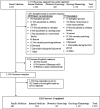Differences between primary care physicians' and oncologists' knowledge, attitudes and practices regarding the care of cancer survivors
- PMID: 21785923
- PMCID: PMC3235622
- DOI: 10.1007/s11606-011-1808-4
Differences between primary care physicians' and oncologists' knowledge, attitudes and practices regarding the care of cancer survivors
Abstract
Background: The growing number of cancer survivors combined with a looming shortage of oncology specialists will require greater coordination of post-treatment care responsibilities between oncologists and primary care physicians (PCPs). However, data are limited regarding these physicians' views of cancer survivors' care.
Objective: To compare PCPs and oncologists with regard to their knowledge, attitudes, and practices for follow-up care of breast and colon cancer survivors.
Design and subjects: Mailed questionnaires were completed by a nationally representative sample of 1,072 PCPs and 1,130 medical oncologists in 2009 (cooperation rate = 65%). Sampling and non-response weights were used to calculate estimates to reflect practicing US PCPs and oncologists.
Main measures: PCPs and oncologists reported their 1) preferred model for delivering cancer survivors' care; 2) assessment of PCPs' ability to perform follow-up care tasks; 3) confidence in their knowledge; and 4) cancer surveillance practices.
Key results: Compared with PCPs, oncologists were less likely to believe PCPs had the skills to conduct appropriate testing for breast cancer recurrence (59% vs. 23%, P < 0.001) or to care for late effects of breast cancer (75% vs. 38%, P < 0.001). Only 40% of PCPs were very confident of their own knowledge of testing for recurrence. PCPs were more likely than oncologists to endorse routine use of non-recommended blood and imaging tests for detecting cancer recurrence, with both groups departing substantially from guideline recommendations.
Conclusion: There are significant differences in PCPs' and oncologists' knowledge, attitudes, and practices with respect to care of cancer survivors. Improving cancer survivors' care may require more effective communication between these two groups to increase PCPs' confidence in their knowledge, and must also address oncologists' attitudes regarding PCPs' ability to care for cancer survivors.
Figures



References
-
- Edwards BK, Ward E, Kohler BA, Eheman C, Zauber AG, Anderson RN, et al. Annual report to the nation on the status of cancer, 1975–2006, featuring colorectal cancer trends and impact of interventions (risk factors, screening, and treatment) to reduce future rates. Cancer. 2010;116:544–73. doi: 10.1002/cncr.24760. - DOI - PMC - PubMed
-
- Hewitt M, Greenfield S, Stovall E. From cancer patient to cancer survivor: Lost in transition. Washington: Institute of Medicine, National Academies Press; 2005.
Publication types
MeSH terms
LinkOut - more resources
Full Text Sources

